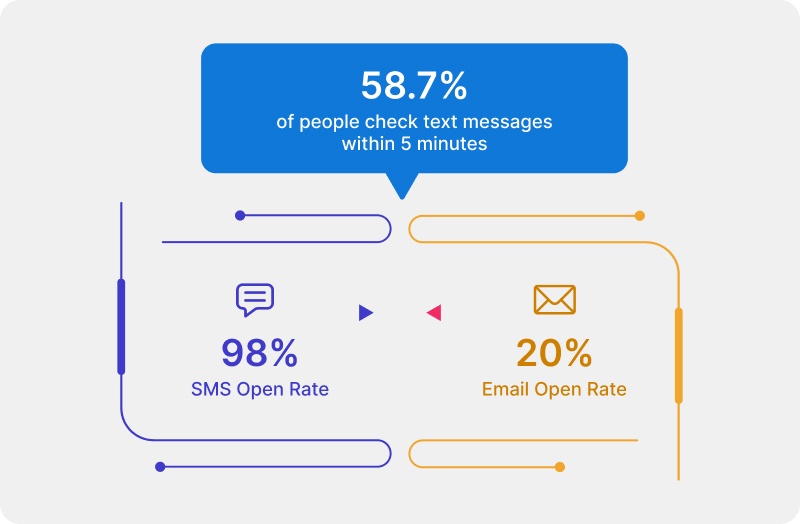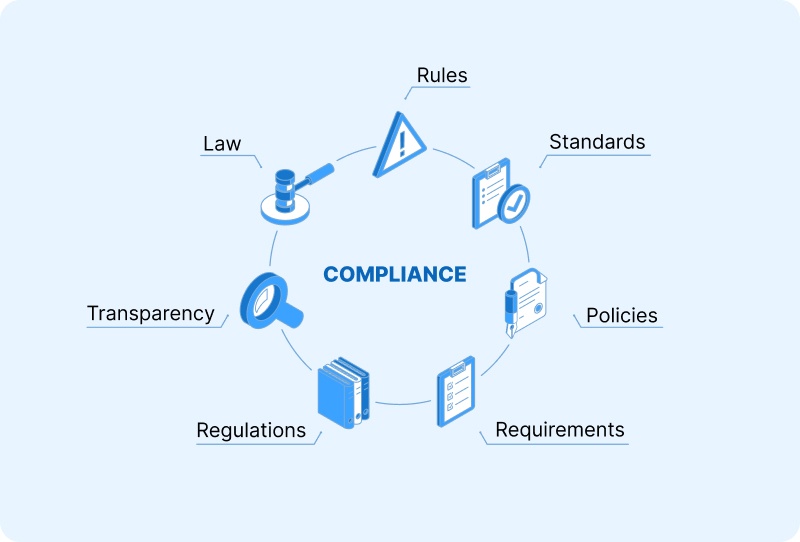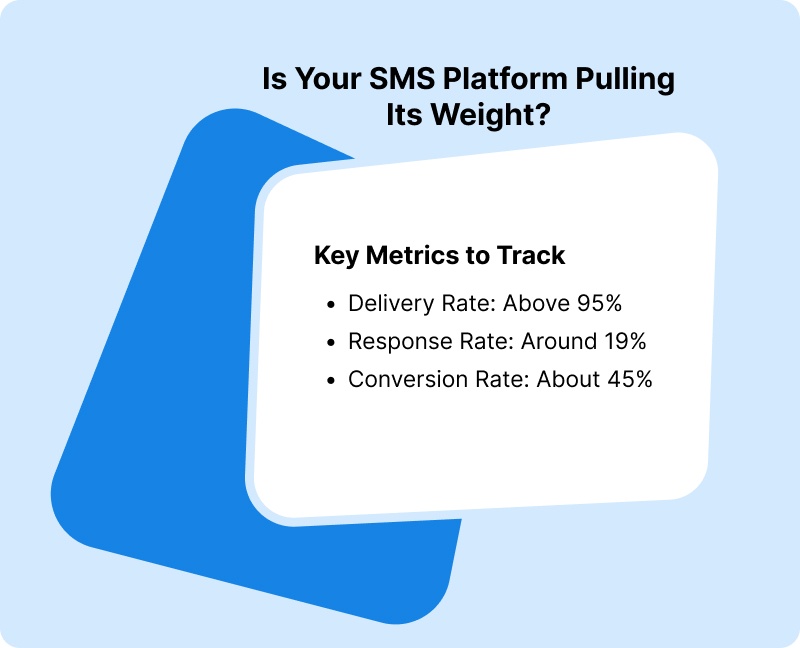
Let’s be real – emails don’t always get opened, ads are often scrolled past, and apps go unopened. But what about text messages? Those get noticed. An SMS platform provider makes this all possible by giving businesses the power to send bulk messages, automate campaigns, and engage customers across the globe. In other words, they provide the technology, reach, and reliability to turn every text into a touchpoint that matters.
Let’s learn about SMS platform providers through this post.
What is an SMS Platform Provider?
An SMS Platform provider, often called an SMS gateway provider, is a company that provides businesses, aggregators, Mobile Network Operators (MNOs), and Mobile Virtual Network Operators (MVNOs) a centralized system to send, receive, and manage SMS messages at scale. They have the infrastructure and tools to enable seamless communication through Application-to-Person (A2P), Person-to-Application (P2A), and Person-to-Person (P2P) messaging.

Typically, an SMS platform provider acts as a bridge between businesses and telecom carriers to facilitate messaging services. From ensuring high-message deliverability to security and compliance with telecom regulations, a reliable SMS platform provider is crucial for effective and sustainable SMS communication.
Let’s move further to understand the type of SMS services offered by SMS platform providers. Mainly, they cover 3 types of SMS services, which are:
1. A2P Messaging
A2P or Application-to-Person Messaging is the type of messaging where businesses send SMS to customers. Some simple examples of A2P messaging are OTPs, notifications, and promotions.
2. P2A Messaging
P2A, or Person-to-Application Messaging, is the type of messaging where customers text businesses. Common examples of P2A messaging include, e.g., voting via SMS, customer feedback.
3. P2P Messaging
P2P or Person-to-Person messaging is the type of messaging in which individuals directly exchange SMS messaging between them. For example, a person says a casual hello to his friend via SMS.
How Does an SMS Platform Work?
SMS platforms enable message transmission between sender and receiver by integrating with telecom operators and enterprise applications. Here’s how the process of SMS delivery happens, step-by-step:
1. Message Initiation
The first step of the messaging process is that a business system or a user initiates a message via API, web portal, or software integration.
2. Routing & Optimization
After initiation, the SMS platform selects the most cost-effective and reliable route using routing algorithms such as Least-Cost Routing (LCR).
3. Carrier Connection
The SMS platform sends the message through an SMS Gateway that connects with global carriers.
4. Delivery & Status Reporting
The message is delivered to the recipient’s device, and the platform provides real-time status updates (delivered, failed, pending, etc.).
The working of the SMS transmission process clearly signifies the fact that an SMS platform is much more than just sending messages – it’s about optimizing delivery, engagement, and ROI.
Key Features of a Reliable SMS Platform
A reliable, high-quality SMS platform should include the following features:
Scalability & High Throughput
An SMS platform should have the ability to handle a large volume of messages without experiencing performance issues like delays or failures. Most businesses require bulk messaging services for marketing and promotional needs, therefore, scalability is pivotal in an SMS platform. In terms of throughput, the SMS system should be able to process and send millions of SMS messages per second. This is important for time-sensitive SMS campaigns.
Consider an e-commerce retailer executing a flash sale via an SMS campaign. During the first hour of the campaign, millions of customers tried to claim their discounts via SMS. In such a scenario, a scalable and high-throughput SMS platform can ensure that all messages are sent promptly, preventing issues like delays leading to customer frustration.
Intelligent Routing & Load Balancing
An SMS platform with an intelligent routing feature will ensure an optimal delivery path for each message sent, considering factors like network congestion, delivery speed, cost, etc. The platform should also have a load-balancing feature to distribute the SMS traffic across multiple servers, thus preventing overload on any single server and ensuring smooth message delivery.
For example, when message traffic is at its peak, the SMS platform automatically diverts messages to less congested networks to maintain delivery speed. When a server starts to become overloaded, the SMS system automatically transfers the extra traffic to other servers.
Compliance & Security
The SMS platform should comply with data privacy regulations such as GDPR, TCPA, etc. It should be equipped with encryption and other security mechanisms to ensure the protection of sensitive data during SMS transmission and storage. For example, an SMS platform provides tools for managing opt-in and opt-out requests. So, when a customer requests that all of their data be deleted, the platform makes that process simple.
Advanced Analytics & Real-Time Reports
An SMS platform with the ability to provide detailed insights into campaign performance, such as message delivery rates, is useful for businesses in monitoring their campaigns and making adjustments as needed.
Let’s take an example where a marketing team leverages real-time reports to track the performance of a promotional campaign. After analysis, they notice a low delivery rate in a specific geographical area, make adjustments accordingly.
API & CRM Integration
The SMS platform should have the ability to integrate with CRM systems, i.e., customer relationship management systems and other existing business applications, through API integration. This is essential for automated messaging and personalized or customized SMS communication with customers.
For example, a business integrates the SMS platform with its existing CRM system. Through this integration, they automate appointment reminders and after-sales follow-up messages.
Benefits of Using an SMS Platform
We’ve talked about the features and what they do for you. Now, let’s really get into why using an SMS platform is so valuable.
Instant & High Engagement

According to various sources, SMS messages are typically read within minutes of receipt; particularly, 90% of SMS messages are read within 3 minutes of delivery. In terms of engagement rates, SMS has a 6x higher engagement rate than email. This fact alone makes SMS ideal for urgent and time-sensitive communications. For instance, a business sends a last-minute promotional offer via SMS. Customers who receive the message are likely to act on it immediately because they open and read it right away.
Cost-Effective Marketing & Communication
Compared to traditional marketing methods like print, television, or radio, SMS turns out to be significantly affordable. The direct and targeted nature of SMS helps businesses reach out to customers without making any substantial investments.
Suppose an event organizer uses SMS to send out updates and last-minute changes. Doing so would be impossible through print.
Automation & Efficiency
The automation offered by SMS platforms helps streamline communication workflows. Suppose a delivery service sends automated SMS notifications to customers about when their parcels are out for delivery.
How to Maximize ROI with an SMS Platform?
Whether you are an SMS aggregator, an MNO, MVNO, or simply a business using an SMS platform for SMS communication, you certainly seek to generate maximum return on investment. We have gathered a list of best practices, common mistakes, and techniques to gauge the performance of your SMS campaigns to help you out:

Best Practices to Generate Maximum ROI from an SMS Platform
-
Segment Your Audience
Do you know what could be the worst thing you can do in a marketing campaign? It is sending generic messages to your entire contact list. Segmentation of your audience, i.e., dividing your audience into smaller, more specific groups based on shared characteristics, is essential. Such a segmentation allows you to tailor your messages to their interests and needs, which means the audience can resonate better with your messages. In other words, sending targeted messages based on customer behavior, interests, and demographics boosts open rate and thus higher engagement and conversion rates.
-
Optimize Timing & Frequency
Flooding your audiences’ inboxes with too many messages or sending them at inconvenient times can lead to customer frustration and high opt-outs. It is, therefore, important to optimize the timing and frequency of your SMS campaigns to ensure decent engagement and maintain a positive brand image.
-
Use Short & Clear Messaging
Standard SMS messages have a limit of 160 characters. This means you need to practice conciseness, clarity, and strong CTAs to ensure that your audience understands your message easily and instantly.
-
Leverage Automation
Automation can simplify a lot of things for you. You can schedule messages or set them based on triggers to improve work efficiency, personalize interactions, and provide customers with instant responses.
-
Monitor & Improve Performance
Your efforts need to be evaluated because only then can you ensure that you are going in the right direction. By regularly monitoring the performance of your SMS campaigns, you can identify what’s working and what’s not. Keep a check on delivery rates, click-through rates or CTRs, and conversion rates to optimize your strategies for better ROI.
Common Mistakes to Avoid When Using an SMS Platform

Below are some critical mistakes that businesses often make with SMS marketing. Here’s a breakdown:
Sending Bulk SMS Without Personalization
Treating all your customers as a single, undifferentiated group can make your business seem impersonal and out of touch. It can affect your engagement and conversion rates.
Ignoring Regulatory Compliance

It is important to understand that SMS marketing is subject to various regulations that vary by region. Failing to comply with these regulations can lead to significant legal and financial repercussions. For example, if a business sends messages to customers who have opted not to receive such messages is a violation of the regulation and can result in fines.
Not Providing an Opt-Out Option
It is mandatory to provide SMS recipients a clear and easy way to unsubscribe from receiving further messages. While this is a legal requirement, it also signifies your respect for customer preferences. On the other hand, if a business doesn’t fails to provide an opt-out option to its customers, then it can result in higher customer complaints and opt-out rates.
How to Evaluate the Performance of Your SMS Campaigns?

-
Delivery Rate: Above 95%
Delivery rate is a fundamental metric for assessing the reliability and efficiency of an SMS platform. It is the percentage of SMS messages sent that were successfully delivered to the recipients’ mobile devices. Make sure the delivery rate is above 95%.
-
Response Rate: Around 19%
After delivery rate, the next important metric you need to check is the response rate, i.e., the measure of how many recipients engaged with your message by replying to it. This is particularly relevant for two-way SMS communication, such as feedback requests. A healthy response rate for A2P SMS is typically around 19%.
-
Conversion Rate: About 45%
Conversion rate signifies the desired action taken by the recipient of the message. Some simple examples include clicking a link in an SMS and completing a transaction on your website or clicking on a link to learn more about a product.
Conversion rates can vary based on your target audience, type of service offered, timing and frequency, and relevance; however, in the case of A2P, 45% is considered a decent conversion rate.
How to Choose the Best SMS Platform Provider?
The simplest way to find a product that fits your business is to ask the right questions—and seek clear answers. I have compiled a list of top questions to ask when choosing the best SMS platform provider. Here you go!

1. Compliance & Security
Compliance and security are paramount in today’s digital world, so begin filtering your list of SMS platform providers by asking these questions:
- Does the provider comply with GDPR, TCPA, and regional telecom laws?
- Are messages encrypted and protected against fraud?
2. Pricing & Cost Structure
Your questions regarding the cost of the SMS platform service should be clear from the very beginning. Therefore ask:
- Is pricing pay-as-you-go, subscription-based, or volume-based?
- Are there hidden fees for routing, API access, or delivery reports?
3. API & Integration Capabilities
Get a clear idea about the real value or usefulness of the SMS platform for your business by asking these questions:
- Does the SMS platform integrate with CRM, ERP, and marketing tools?
- Are there SMPP, HTTP, and REST API options available?
4. Customer Support & Service Level Agreements (SLAs)
Make it a thumb rule to never commit to a service before you have satisfactory answers to the following questions:
- Is 24/7 technical support available?
- Does the provider offer uptime guarantees of 99.99% or higher?
REVE SMS Platform: Powering Instant & Reliable Business Communication
At REVE, we provide our clients with a powerful and reliable SMS Platform that enables effortless promotional campaigns, transactional alerts, or two-way communication. With real-time analytics, robust API integration, and easy-to-use features, we ensure that REVE SMS empowers wholesale carriers, SMS aggregators, MNOs, and MVNOs to drive engagement and boost customer satisfaction. You can avail a free demo of the SMS platform to understand and test the advanced features of REVE SMS Platform.
Conclusion
SMS remains a highly effective and indispensable communication tool for businesses, aggregators, MNOs, and MVNOs. Choosing the right SMS platform provider ensures high deliverability, compliance, security, and a strong ROI.
By leveraging advanced features like AI-driven routing, real-time analytics, and automation, businesses can maximize engagement, reduce costs, and drive revenue growth.
Are you ready to invest in a powerful SMS platform? Get in touch with our experts to know more about our SMS solution.
Frequently Asked Questions
Do SMS platforms offer free trials or pay-as-you-go options?
Yes, free trials are offered by many SMS platform providers to help businesses understand whether the service aligns with their specific requirements.
Are there any hidden costs associated with using an SMS platform?
Most of the reputable SMS platform providers are transparent with pricing; however, it is always advisable to ask for a full breakdown before committing.
How does an SMS platform prevent spam and fraudulent messages?
SMS platforms are equipped with robust spam prevention tools such as sender ID verification, content filtering, and rate limiting. These security mechanisms work in real time to monitor and act upon any suspicious activities.
Does REVE SMS platform offer two-way messaging functionality?
Yes, modern SMS platforms like REVE offer two-way messaging capabilities, which enable businesses to send and receive SMS messages in real time. Businesses requiring SMS communication for customer support, feedback, and transactional follow-ups can benefit significantly from two-way messaging.
Does REVE SMS platform supports scheduling SMS campaigns?
Yes, you can schedule SMS campaigns in advance using REVE SMS platform. It ensures timely delivery based on your target audience’s time zone or behavior.




























